Mom Says Bye-Bye To Her Brother's Unlimited Free Babysitting Service After She Broke His No-Chocolates-In-The-House Rule And Told Her Kids To Secretly Eat It Anyway
Childcare is not cheap. When a friend or a loved one offers to babysit your kids for free when you need it, you jump at that opportunity.
OP is the go-to uncle for babysitting duties. He is 37 years old, single, and childfree, plus he has two German Shepherd dogs who are loved by his niblings (nieces and nephews).
OP has four sisters, and his four sisters have ten children in total, which means OP babysits a lot. He works from home and has volunteered to look after the older children when his sisters need it.
He also takes care of the younger kids, but that is more complex since he has to move his schedule around a bit. With the older kids, they don't need as much supervision, and OP can work in peace while minding his niblings.
OP has one rule: no chocolates in the house. It can be deadly for dogs, and an afternoon without chocolate shouldn't be that difficult for his niblings, who are aged between three and eight years old.
So, four of the children went to OP's house for the day. He was in the kitchen making them drinks, the kids were doing their thing in the living room, and OP's dogs were on the balcony.
When OP went into the living room, he saw chocolate crumbs all over the place. OP asked who brought the chocolate with them.
The seven and eight-year-old admitted to bringing the chocolates.
They said their mom packed it for them, and they always bring chocolates to OP's house when they come over. They haven't been caught because they usually eat the chocolate in secret.
When their mom came to pick them up, OP shared what happened. She got defensive and said her kids were old enough not to leave chocolate crumbs behind.
OP said that because of this incident, he will no longer be available to babysit for this particular sister. OP's sister got mad and told OP he was overreacting.
His other sister is also siding with OP's sister. Their mom also believes OP was an a**hole for putting his dogs above his nieces and nephews.

Was OP wrong for refusing to babysit for his sister after the chocolate incident? You can read the full story below:
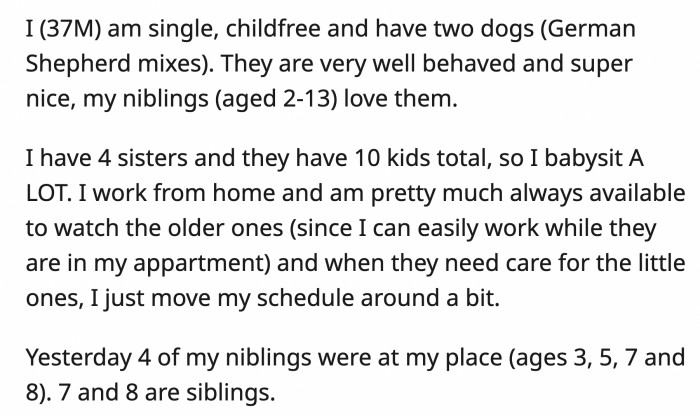

The Dynamics of Family Expectations
Family dynamics play a crucial role in shaping individual behaviors, particularly in the context of expectations and boundaries. Psychologists emphasize that when family members assume specific roles, such as the 'caretaker' or 'the fun uncle,' these roles can create implicit obligations that may lead to resentment if not managed properly. Research conducted by Dr. Susan Johnson at the University of Ottawa highlights how unmet expectations can create tension within familial relationships, especially when one party feels their contributions are undervalued or taken for granted. Furthermore, when boundaries are violated, such as an uncle's rule against chocolates in the house, it can lead to a breakdown of trust and communication, creating rifts that may take time to mend.

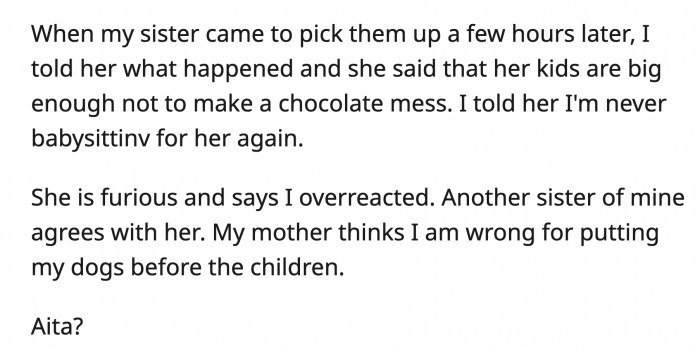
Free babysitter whenever you want, but you have to adhere to this one simple rule. Why would you mess that up?

The concept of emotional intelligence, as outlined by researchers like Dr. Daniel Goleman, indicates that understanding one's emotions and the emotions of others can significantly influence family interactions. When a parent overrides a relative's rules to appease their children's desires, it can send mixed messages about respect and authority. This reflects a lack of emotional awareness, which can lead to greater conflicts and misunderstandings. Dr. Goleman's work suggests that fostering emotional intelligence within family settings can help mitigate these conflicts by promoting better communication and respect for each other's boundaries. For families facing similar dilemmas, engaging in open discussions about feelings and expectations can create a more harmonious environment.
Out of his four sisters, only one of them couldn't respect OP's one reasonable rule
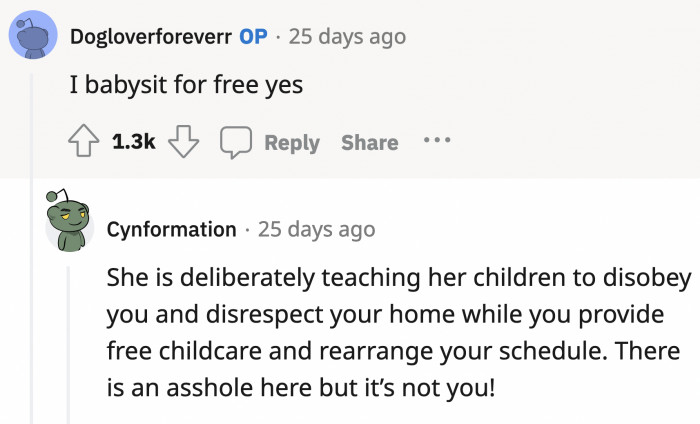
That's the priority that should be questioned, not OP's concern for his dogs' safety
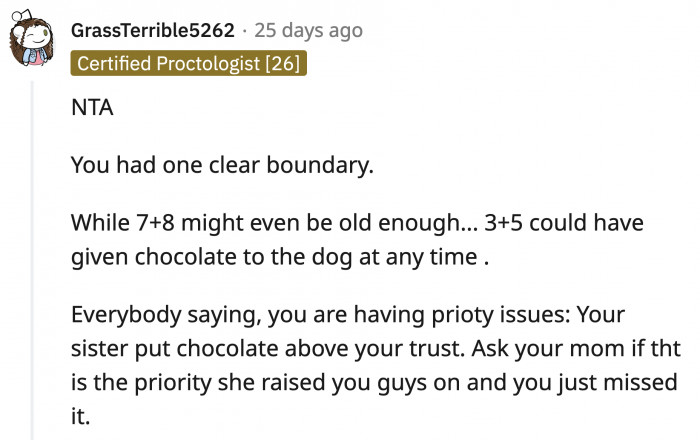
She looped her kids in with the lie, and they broke OP's trust. Now she has to face the consequences.
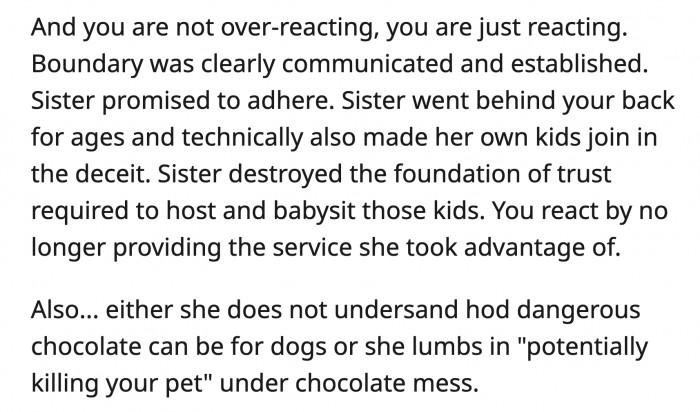
The Role of Reciprocity in Relationships
Reciprocity is a fundamental principle in social psychology that highlights the mutual give-and-take expected in relationships. According to research by Dr. Robert Cialdini, reciprocity fosters trust and cooperation, which are essential for healthy family dynamics. When OP's sister breaks the no-chocolates rule, it not only violates an established agreement but also undermines the trust that OP has built as a caregiver. This breach may lead OP to reconsider his willingness to provide childcare in the future, illustrating how one party's actions can ripple through the entire family unit. Implementing clear agreements and respecting each other's boundaries can enhance the sense of reciprocity, ensuring that all family members feel valued and respected.
See, OP even taught the kids what they should do if they want to feed the dogs. Like what a responsible adult should do.

They may not die immediately, but the kids could just as easily feed them a lethal amount of chocolate accidentally.

She asked her kids to eat the chocolates in secret; she knows about the rule.
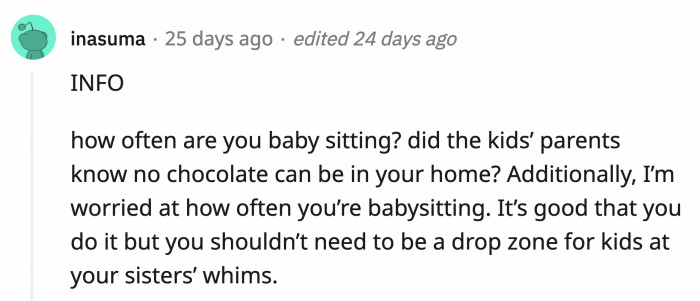
In many family systems, the act of babysitting can be seen as a transactional relationship, where one party provides a service that the other party benefits from. However, the emotional undercurrents often complicate this dynamic. Research indicates that when family members provide services like babysitting, they may harbor expectations of appreciation or acknowledgment, which, if unmet, can lead to feelings of exploitation or dissatisfaction. Therapeutic approaches, such as family systems therapy, emphasize the importance of open communication about these expectations. Families can benefit from directly addressing these feelings and ensuring that everyone involved feels appreciated, thus reducing the potential for resentment in future interactions.
OP didn't have a problem babysitting his nieces and nephews. He actually enjoyed it, but his sister was too disrespectful and ruined it.
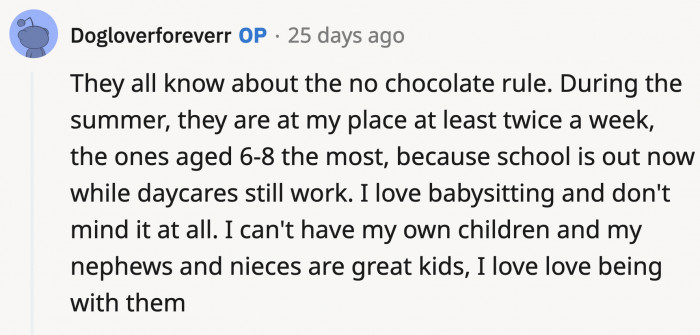
Why do the kids always have chocolate with them anyway?

See? OP is not unreasonable, and it's not like the kids were being deprived of food. OP is just worried about the safety of his dogs, who apparently have a sweet tooth.
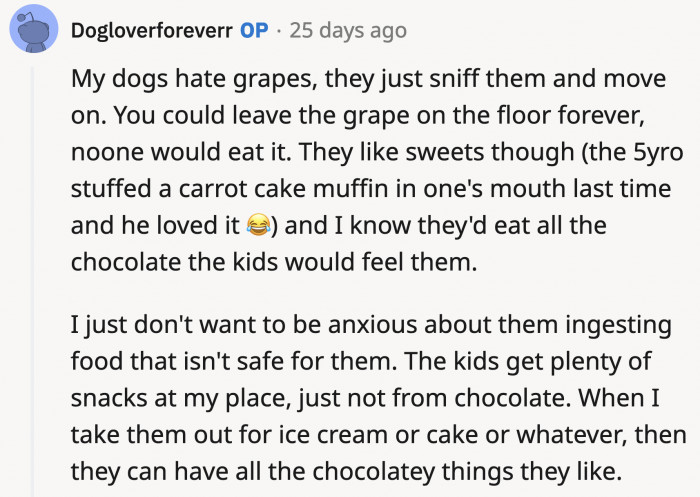
Setting Healthy Boundaries
Setting and respecting boundaries is a vital aspect of maintaining healthy relationships, especially in family settings. According to Dr. Henry Cloud, a clinical psychologist and author, clear boundaries help individuals understand their limits and what is acceptable behavior from others. In the case of OP and his sister, her decision to allow the children to eat chocolates against his wishes represents a failure to respect his boundary. Dr. Cloud’s research suggests that initiating conversations about boundaries can prevent misunderstandings and foster a culture of respect within families. Families should engage in regular check-ins to discuss boundaries openly and clarify expectations, reducing the likelihood of conflict in caregiving arrangements.
Actually, OP didn't overreact. He had a rule; they broke it. He rescinded his very generous offer as a consequence.
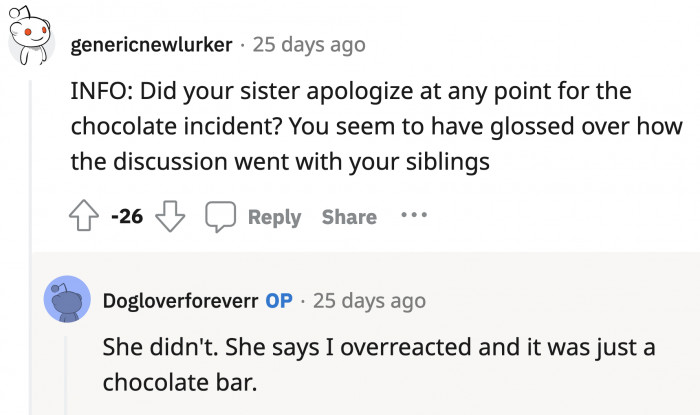
Yes, but would you risk it as a dog owner?

OP is well aware of the amount of chocolate his dogs need to ingest for it to be dangerous. But you can't always rely on kids to be responsible. Accidents happen, and OP is just preventing that.
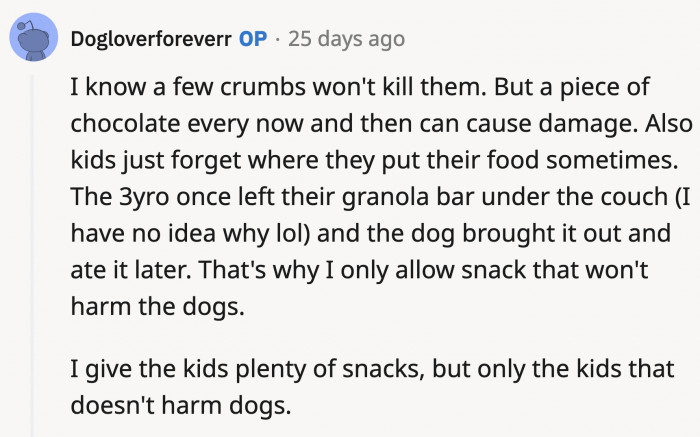
Behavioral psychology suggests that the consequences of actions, such as breaking rules, can significantly impact future behavior. A study published in the Journal of Experimental Psychology indicates that people are more likely to adhere to rules when they understand the reasons behind them and the potential consequences of violating them. In this case, OP's sister's choice to ignore the no-chocolates rule could lead to a natural consequence—his withdrawal from babysitting duties. By communicating the rationale behind family rules and the potential consequences of disregarding them, families can encourage compliance and foster a cooperative environment. Open discussions about rule-making can also empower all family members to contribute to setting boundaries, leading to a more engaged and harmonious family unit.
The mom is actively coaching her children to lie to their uncle to get what they want.

OP's point is valid, and he need not say anything else because he's not the one who should be making compromises here.
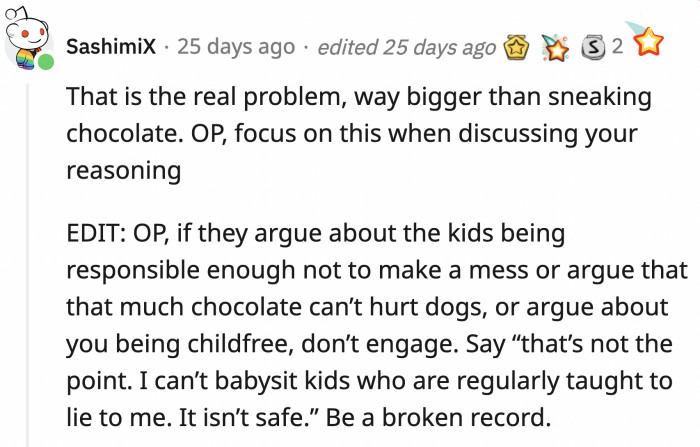
OP's sister has taken his generosity for granted, and that wasn't enough, so she had to stomp all over his boundaries.
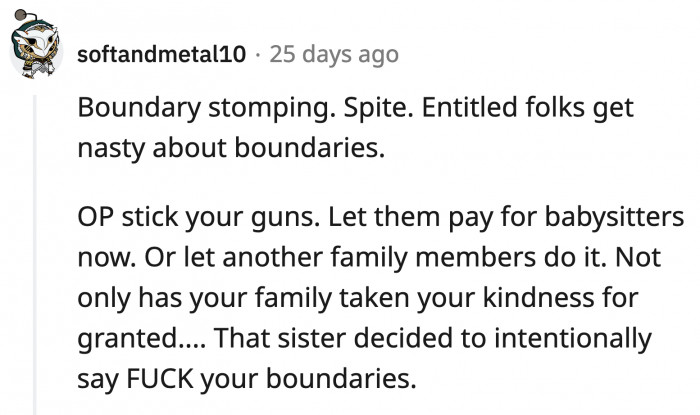
The Psychological Impact of Family Roles
Family roles often carry significant psychological weight, influencing how individuals perceive themselves and their responsibilities. According to research by Dr. Salvador Minuchin, a pioneer in family therapy, rigid roles can lead to dysfunction within family systems. OP’s role as the 'cool uncle' comes with certain expectations that, when violated, can create tension. This role can become a source of stress if OP feels his contributions to the family are not reciprocated or respected. Families can benefit from recognizing and discussing these roles openly to avoid negative emotional impacts. Encouraging flexibility in roles can help alleviate the pressure and allow family members to navigate their identities more comfortably.
Let's see how fast she apologizes when those babysitting bills add up.
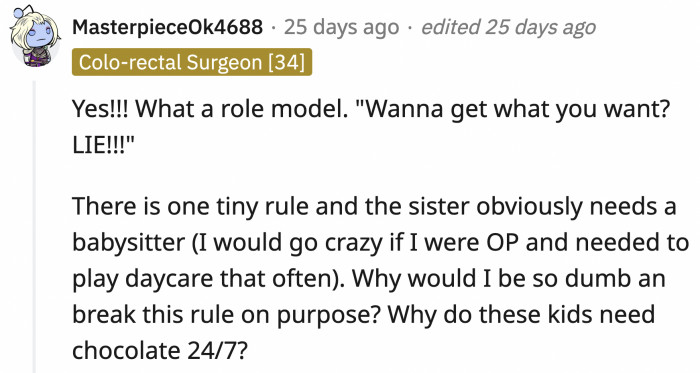
Looks like grandma and the other sister's place is available for unlimited chocolate eating.
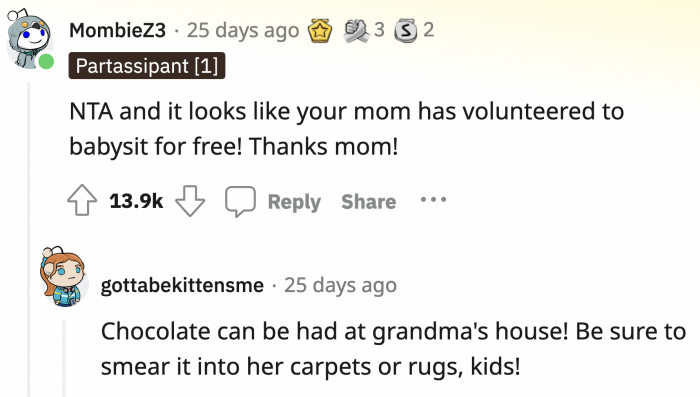
It has been going on for a while, too.

Children learn about boundaries and respect primarily through their caregivers' actions, which makes parental modeling vital. Research indicates that when parents demonstrate healthy boundary-setting, children are more likely to adopt these behaviors as they mature. A study published in the Journal of Child Development highlights how parental influence shapes children's understanding of authority and rules. In this scenario, OP's sister’s actions could teach her children that it’s acceptable to disregard rules set by others, potentially leading to behavioral issues. To counteract this, caregivers should strive to model respect for others’ boundaries, emphasizing the importance of following rules and discussing why they exist. This approach not only reinforces the value of respect but also fosters a healthier family dynamic.
She will surely reap what she sowed when her kids are older.

What if one of the sister's kids was severely allergic to something, and OP ate that food in her presence, knowing full well about the damage it can cause? Will they also give OP a free pass to deliberately ignore that rule?
Probably not. They're only up in arms about this because they're testing how far they can push OP's boundaries; he already babysits for free, so why not let the kids do whatever they want in his house? Now they have their answer.
Psychological Analysis
This situation highlights a common struggle in family dynamics where boundaries are tested. When OP’s sister disregarded his no-chocolates rule, it not only undermined his authority but also showed a lack of respect for his concerns, which can lead to feelings of resentment. This breach of trust illustrates how vital it is for family members to communicate openly about expectations and understand the emotional weight of their roles, as these interactions can significantly impact family relationships.
Analysis generated by AI
Practical Steps for Healing
As families navigate the complexities of caregiving and relationship dynamics, it's essential to remember that clear communication and mutual respect are foundational to maintaining healthy boundaries. Research consistently shows that when families engage in open dialogues about expectations and feelings, they can prevent misunderstandings and foster stronger connections. Ultimately, the goal isn't just about enforcing rules or adhering to roles, but about creating a supportive environment where all members feel valued and understood. By prioritizing these principles, families can enhance their relationships and ensure that caregiving remains a joyful and collaborative experience.



